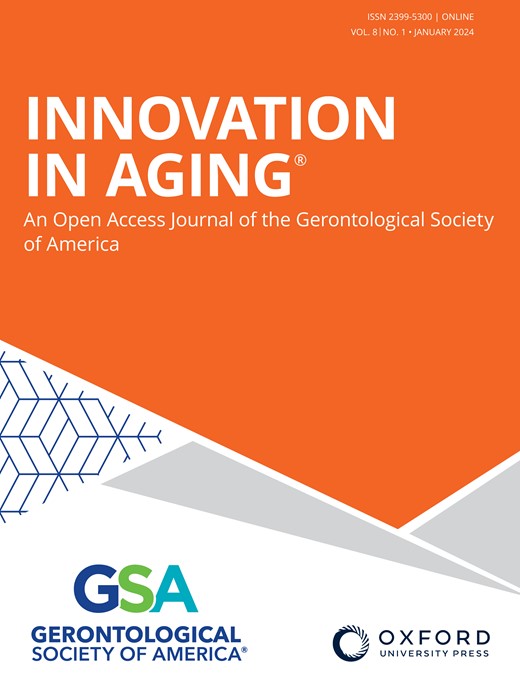SELF-PERCEPTIONS OF AGING AS A PSYCHOLOGICAL RESOURCE FOR ENRICHMENT SEEKING
IF 4.9
3区 医学
Q1 GERIATRICS & GERONTOLOGY
引用次数: 0
Abstract
Abstract In older adulthood, positive perceptions of one’s own aging can facilitate enrichment seeking–the underlying motivation to seek out new experiences and perform intellectually challenging activities–by diminishing and buffering reactions to perceived threats to one’s sense of self and perceived capabilities. In this study, we examined the extent to which self-perceptions of aging were associated with cognitive performance and affective experience while completing a series of challenging foraging tasks in the form of word puzzle games within the presence and absence of resources in the environment, such as a fireplace or an observing neurologist. The study employed a 2x2 within-person design (fireplace on vs. not; neurologist present vs. not) and took place within the home office of a home simulation environment. In each of the four conditions, 61 participants (age 50-82, 57% female) played the foraging task and then endorsed adjectives representing their feelings while playing that game. Multilevel models, which nested study stages within participants, showed individuals with higher self-perceptions of aging benefited significantly from both environmental manipulations, with the fireplace acting as environmental support and the observing neurologist raising the stakes of the task. However, despite providing additional motivation and being associated with stronger cognitive performance, the neurologist’s presence also provoked a higher negative affect response. The relationship between self-perceptions of aging and receptiveness to environmental resources merits further investigation to assess how certain environmental resources might act as a moderator of both cognition and affect.对衰老的自我认知是寻求充实的心理资源
摘要 在老年期,对自身衰老的积极认知可以减少和缓冲对自我感觉和认知能力所受威胁的反应,从而促进丰富性的寻求--寻求新体验和进行智力挑战活动的潜在动机。在这项研究中,我们研究了在环境资源(如壁炉或观察神经科医生)存在或不存在的情况下,以文字拼图游戏的形式完成一系列具有挑战性的觅食任务时,自我衰老感与认知表现和情感体验的关联程度。研究采用了 2x2 人内设计(壁炉打开与否;神经学家在场与否),在家庭模拟环境的家庭办公室内进行。在四种情况下,61 名参与者(年龄在 50-82 岁之间,57% 为女性)分别进行了觅食任务,然后对代表他们玩游戏时感受的形容词进行了背书。将研究阶段嵌套在参与者中的多层次模型显示,对衰老有较高自我认知的人从两种环境操作中获益匪浅,其中壁炉起到了环境支持的作用,而观察神经学家则提高了任务的风险。然而,尽管神经学家提供了额外的动力并与更强的认知表现相关联,但他的存在也引发了更高的负面情绪反应。对衰老的自我认知和对环境资源的接受能力之间的关系值得进一步研究,以评估某些环境资源可能如何对认知和情感起到调节作用。
本文章由计算机程序翻译,如有差异,请以英文原文为准。
求助全文
约1分钟内获得全文
求助全文
来源期刊

Innovation in Aging
GERIATRICS & GERONTOLOGY-
CiteScore
4.10
自引率
0.00%
发文量
72
审稿时长
15 weeks
期刊介绍:
Innovation in Aging, an interdisciplinary Open Access journal of the Gerontological Society of America (GSA), is dedicated to publishing innovative, conceptually robust, and methodologically rigorous research focused on aging and the life course. The journal aims to present studies with the potential to significantly enhance the health, functionality, and overall well-being of older adults by translating scientific insights into practical applications. Research published in the journal spans a variety of settings, including community, clinical, and laboratory contexts, with a clear emphasis on issues that are directly pertinent to aging and the dynamics of life over time. The content of the journal mirrors the diverse research interests of GSA members and encompasses a range of study types. These include the validation of new conceptual or theoretical models, assessments of factors impacting the health and well-being of older adults, evaluations of interventions and policies, the implementation of groundbreaking research methodologies, interdisciplinary research that adapts concepts and methods from other fields to aging studies, and the use of modeling and simulations to understand factors and processes influencing aging outcomes. The journal welcomes contributions from scholars across various disciplines, such as technology, engineering, architecture, economics, business, law, political science, public policy, education, public health, social and psychological sciences, biomedical and health sciences, and the humanities and arts, reflecting a holistic approach to advancing knowledge in gerontology.
 求助内容:
求助内容: 应助结果提醒方式:
应助结果提醒方式:


